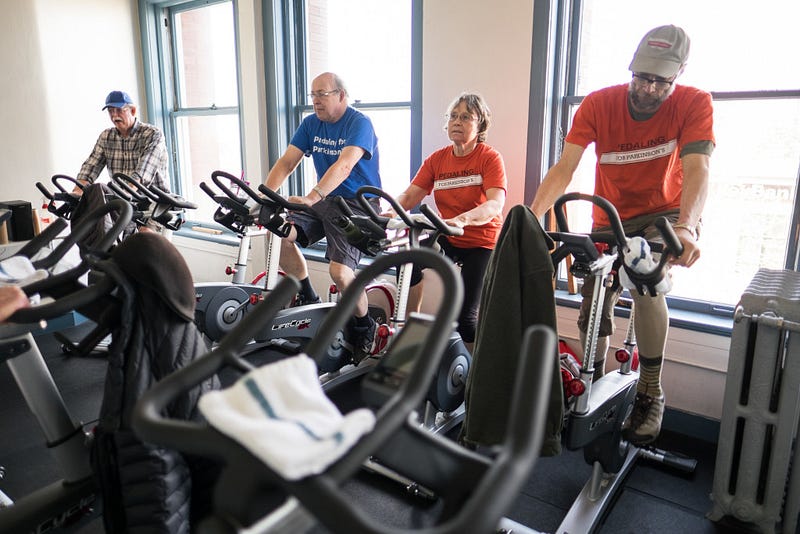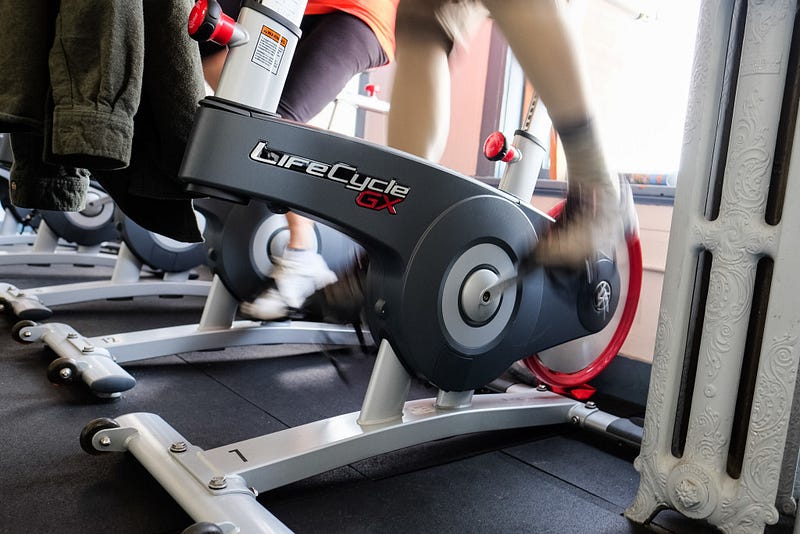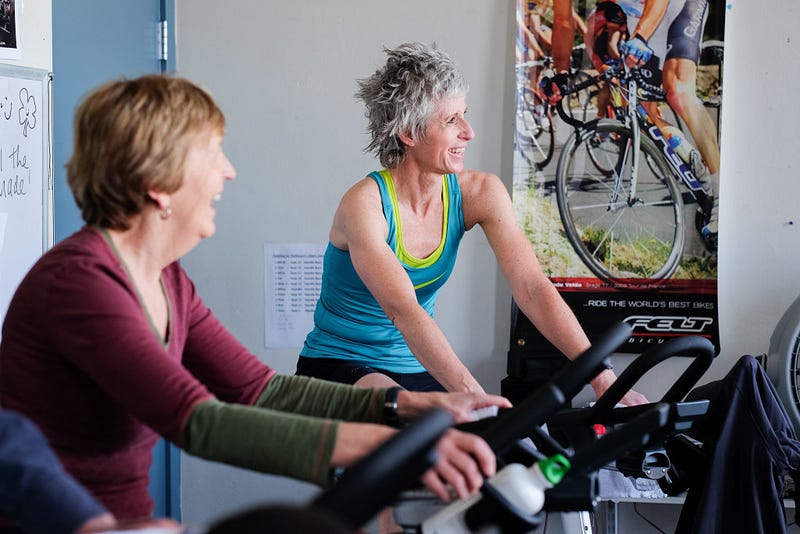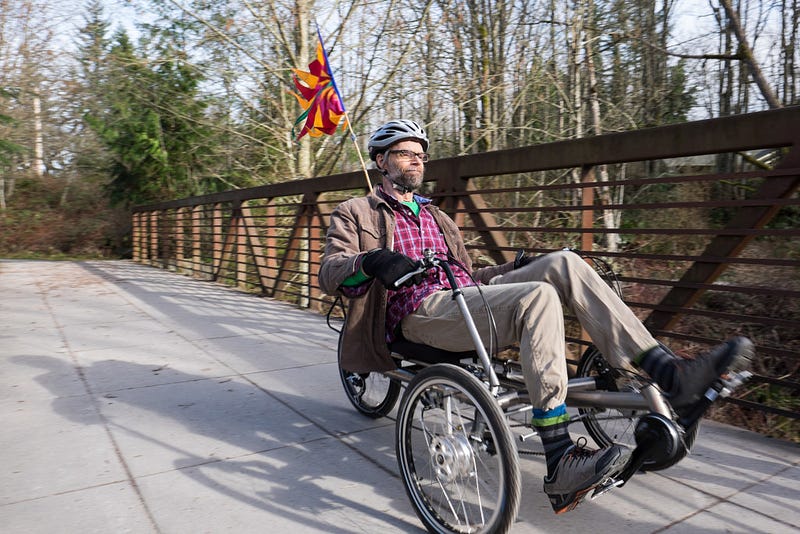Pedaling with Purpose
Alternative therapy brings local Parkinson’s community together
STORY BY KIERAN BOYLE | PHOTOS BY JAKE TULL
Rick Hermann goes to the YMCA in downtown Bellingham for his 12 p.m. spin class three days a week. As soon as the last of the participants arrive, the door shuts and the outside noise disappears. Conversation immediately fills the room with people talking about what they did over the long weekend as the pedaling on stationary bikes begins.
This is no ordinary spin class though; it’s a class specially designed to combat Parkinson’s disease.

Hermann is one of the seven million people who have had their daily lives affected by the chronic movement disorder, but Parkinson’s has been far from defining for him.
Hermann was 41 when he began to show symptoms of the disease. From 1992 on he found his handwriting becoming less accurate, which he later realized was an early symptom of Parkinson’s. It wasn’t until 1998 that he was tested and was diagnosed. This isn’t surprising, considering barely 4 percent of diagnoses are made before age 50, according to the Parkinson’s Disease Foundation.
Looking at Hermann you would never guess that the 6-foot-tall athletic man is 65-years-old. He hasn’t let Parkinson’s slow him down.
“I throw everything I’ve got at Parkinson’s,” Hermann says. “I do biking, walking, and Tai chi — If you don’t keep moving, you kind of just fade away.”

Hermann has cycled his entire life, but found it to be increasingly difficult when he started to experience the symptoms of Parkinson’s. It was then that he discovered recumbent bikes.
A recumbent bike seat is placed further back on the bike in a reclined position that puts less stress on the body. Hermann bought a recumbent bike and began biking as a mode of transportation and staying active.
Hermann explains that when you have Parkinson’s, the dopamine-producing cells in your brain begin to die. Lack of dopamine causes symptoms like tremors, muscle rigidity and slowed movement. While medicine helps, forms of physical therapy are just as important to fight these progressive symptoms of Parkinson’s.
To help ease these symptoms, Hermann has partaken in multiple therapies throughout the years such as dancing, acting and even deep brain stimulation.
The one therapy that really caught Hermann’s attention was Pedaling for Parkinson’s at the YMCA.
Nan Little, a retired University of Washington anthropologist, is responsible for expanding Pedaling for Parkinson’s to YMCA facilities throughout the country, such as in Bellingham. She found out that sustained pedaling had helped mitigate her symptoms after being diagnosed with Parkinson’s, which inspired her to spread the program.
Tracy Diehl, a Bellingham YMCA employee, is a leader for the local Pedaling for Parkinson’s class.
“Rick Hermann comes religiously, I have never seen him miss a class unless he is sick,” Diehl says. “He is an inspiration and plethora of information.”
Diehl turns on a fan and plugs in some upbeat music to listen to before leading the class. Hermann and the others mount the bikes facing each other and begin cycling. Hermann pedals along without breaking a sweat. Not even the music or the cycling could drown out the friendly chatter and laughs being shared throughout the hour-long class.
At the end of the hour, sighs of relief are released in unison as everyone dismounts their bikes. They all slowly trickle out of the room saying their goodbyes.

While Hermann religiously attends his spin class, his desire to cycle with other Parkinson’s patients doesn’t end as soon as he steps outside. Instead, he wants to find ways to bring the class outside with him.
In 2014 Hermann set out to do this and contacted the local nonprofit Smart Trips to help him organize a bike ride for people with Parkinson’s. With help from nonprofit Outdoors for All Foundation, ten recumbent bikes were donated for the seven-mile ride, which happened on May 17, 2015.
It was a beautiful sunny day at Whatcom Middle School where 16 riders gathered for the ride to Fairhaven, with a pit stop at Boulevard Park for lunch along the way. Ten of the riders had Parkinson’s and some were nervous, not having ridden a bike in a long time. Hermann saw it as a huge success, and thinks that every rider felt extremely satisfied at the end.
“It changed people’s lives, I could see their eyes light up when they started biking,” Hermann says.
This was not just a one-time event though. Hermann is currently in the process of organizing a smaller, yet more ambitious event for the second annual Parkinson’s bike ride. This time he wants to get people down to the Centennial Trail in North Skagit county.
Unfortunately due to the distance, previous sponsors are unable to assist with the bike ride, but this is not stopping Hermann. He believes that while it will be a smaller group, the trail will offer a smoother and unforgettable ride.

Hermann has dedicated himself to his passions, one of them being biking. He believes that these bike rides and support groups are incredibly important for not only people with Parkinson’s, but family members as well.
Today, his passion for biking continues, and he has helped himself and others fight Parkinson’s with an alternative therapy that encourages people to not let their disease define what they can and cannot do.